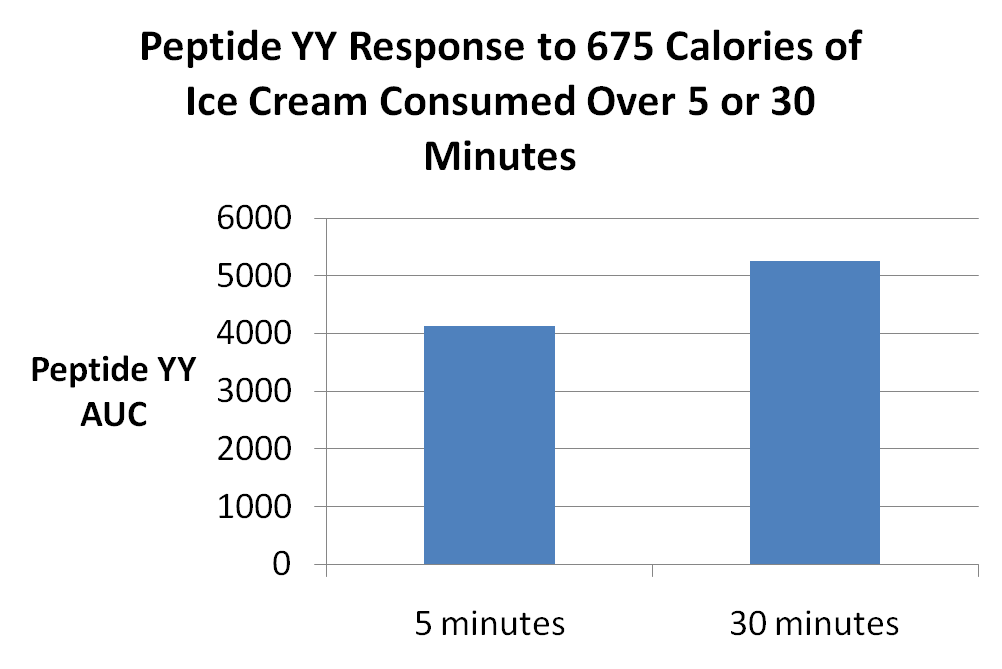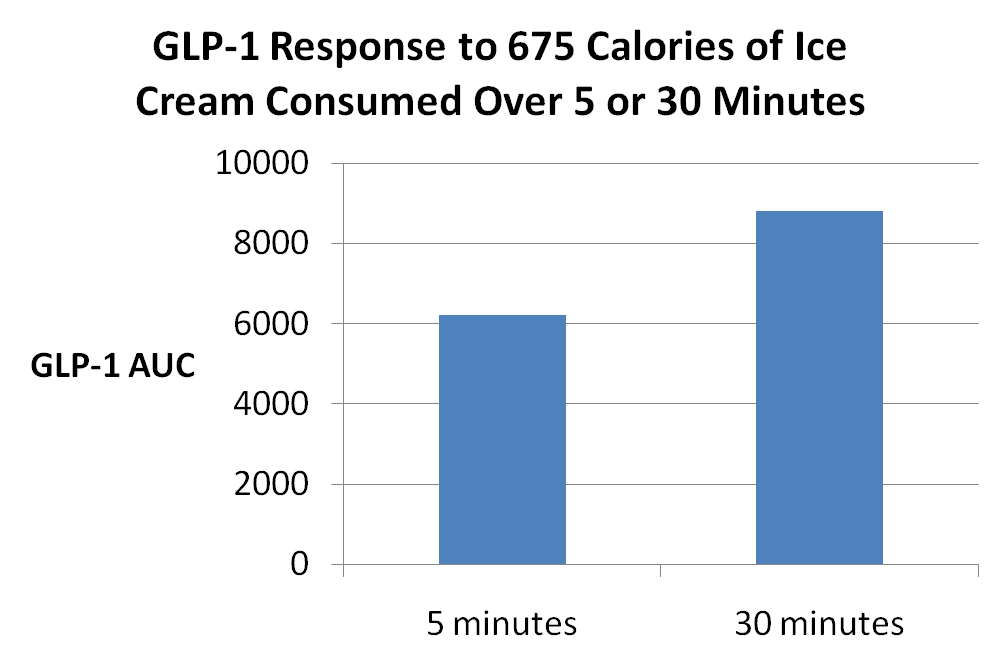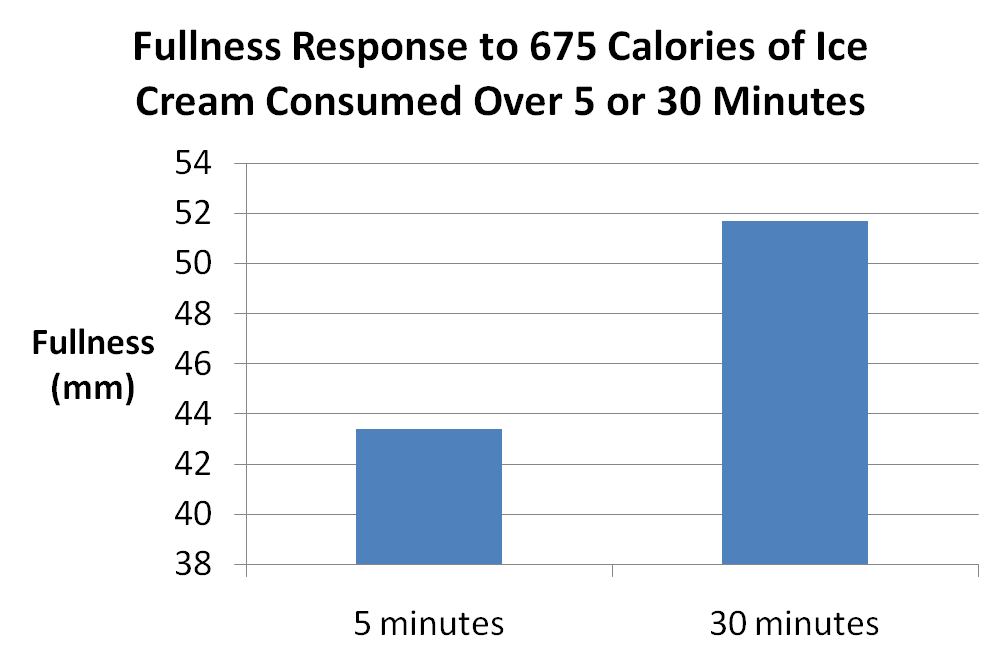Slow down, you eat too fast
You got to make your meal last
Just wolfin' down your meal at home
Lookin for food and feelin' hungry
- Sung to the tune of "Feelin' Groovy" by Simon & Garfunkel
We are often told that we should eat more slowly to feel more full. But is this an old wives' tale, or is there something to this? Observational data does indicate that eating more quickly is associated with higher body weights in children and in adults. In fact, in one study on Japanese adults, people who ate quickly had 84-109% greater odds of being overweight. However, observational studies cannot establish cause and effect. It could be that eating fast is only associated with being overweight. Nevertheless, a cause and effect relationship is plausible. It makes intuitive sense that the faster you eat, the more you'll eat before your gut signals your brain that you're full. But the question is whether this is actually true. Fortunately, research is starting to emerge that has investigated the effect of eating rate on satiety signals, and the evidence is starting to support the idea that eating more slowly may in fact help you eat less.
Hungry Hormones
As I pointed out in a past blog post, hunger and satiety are regulated by a complex interaction of many hormones and signals between your gut and your brain. Three key hormones that are involved in the regulation of appetite are ghrelin, peptide YY (PYY), and glucagon-like peptide (GLP)-1.
- Ghrelin. Ghrelin is a hormone produced by your stomach that stimulates hunger. Ghrelin increases before meals, causing you to want to eat. Likewise, eating suppresses ghrelin so that you no longer feel hungry.
- PYY. PYY is a hormone produced by your intestines in response to food ingestion. PYY travels through your bloodstream to your brain and tells you that you are full. The more PYY that is produced, the more full you feel.
- GLP-1. Like PYY, GLP-1 is a hormone produced by your intestines in response to food ingestion. Also, like PYY, GLP-1 feeds back on your brain and tells you that you are full. GLP-1 also helps stimulate your body to release insulin, which is another hormone that makes you feel full.
If eating speed can affect satiety, then these three hormones are possible candidates through which eating speed might mediate its effects. European researchers recently looked at the effects of eating speed on these three hormones, and how that related to feelings of hunger and fullness.
Ice Cream Headaches
The researchers recruited 17 healthy adult men for this study. The men came into the lab on two separate mornings (after an overnight fast) and consumed a test meal. These two separate occasions were separated by at least a week. The test meal consisted of 300 milliliters of ice cream, which amounted to 675 calories. The ice cream contained 59% of its calories from fat, 33% from carbohydrate, and 8% from protein. During one lab session, the ice cream was divided into two equal portions, which were consumed 5 minutes apart (talk about an ice cream headache!). During the other lab session, the ice cream was divided into seven equal portions, which were consumed every 5 minutes so that it took 30 minutes to consume all of the ice cream. Subjects were instructed to finish each portion in less than 1 minute to maintain a uniform rate of meal ingestion. The researchers took blood samples before the meal and at 30-minute intervals after the beginning of meal consumption until the end of the session 210 minutes later. The blood samples were measured for glucose, insulin, ghrelin, PYY, and GLP-1. The subjects completed subjective ratings of their hunger and fullness during the meal and at 30-minute intervals after the end of the meal until the end of each lab session.
Fast Findings
There were no significant differences between the conditions in the area under the curve (AUC, an aggregate measure of a response over time) for glucose, insulin, or ghrelin. However, there were significant differences for PYY and GLP-1. PYY was significantly higher when the ice cream was consumed over 30 minutes versus 5 minutes:
GLP-1 was also significantly higher when the ice cream was consumed more slowly:
While there were no significant differences in hunger ratings, there was a trend for feelings of fullness to be higher when the ice cream was consumed more slowly:
Slow Down...You Eat Too Fast...You Got to Make Your Meal Last...
The results of this study indicate that eating more slowly can amplify the physiological signals that help you feel full, namely PYY and GLP-1. Eating more slowly resulted in greater levels of these hormones, which also resulted in a trend towards feeling more full. This lends credence to the idea that eating too quickly may result in overeating, and supports the possibility that there may be at least some cause/effect relationship between eating quickly and weight gain. It may also be one of the reasons why processed food can contribute to overeating; processed foods are consumed more quickly than whole foods. It may also be one of the mechanisms behind why liquid calories are less satiating than calories from solid foods; for example, it takes less than 2 minutes to consume 500 grams of apple juice but 17 minutes to consume 500 grams of whole apples. At these rates, it would take 2 hours to consume 2000 calories worth of apples, but only 18 minutes to consume 2000 calories worth of apple juice.
Of course, in this study, the men consumed 675 calories in both conditions. This study can only tell us that eating more slowly can help you feel more full and will amplify the physiological signals to do so. However, the question is whether this will ultimately translate into eating less calories. There is some experimental data that indicates that it will, which I will discuss in a future issue of Weightology Weekly.




Your blog was absolutely fantastic! Large amount of great information which is often attractive some and the other way.Thanks.
<a href=”https://www.fitnesshealthforever.com/fitness/physical-activity-and-diet-to-follow-for-belly-fat-burn/” data-href=”https://www.fitnesshealthforever.com/fitness/physical-activity-and-diet-to-follow-for-belly-fat-burn/”title=”diet to burn belly fat”>diet to burn belly fat</a>
Interesting, this definitely jibes with my experience that eating continuously until I feel full always overshoots and I’m stuffed later. If I’m in a rush and can’t wait a while, eating until 60-70% satisfied usually works. I know that the full satiety will come later.
Nice one James. I’ve notice that most skinny folks who complain about having a hard time gaining weight tend to eat slower than their overweight counterparts and vice-versa. Out of all the variables of weight management, I think the rate of eating and NEAT are two of the main ones that most folks tend to overlook. What I would like to know more about is protein’s role in the rate at which satiety kicks in. Does it increase PYY and GLP-1 faster than the other two macro? Since protein is more satiating than fat or carb, would it be safe… Read more »
Shoua,
Thanks for your comment. There is some data out there regarding the effects of protein on PYY and GLP-1. I’ll try to cover it in a future issue of Weightology Weekly.
Thanks!
I’d be interested to know if fullness “catches up” after a while. If I read this correctly, the fullness was measured right after eating, either at 5 minutes or 30. I’d like to see the fullness measure of the 5 minute group at 30 minutes. Did their fullness catch up by that point? Or put another way, is there any validity to my mother’s advice of waiting 20 minutes after eating to see if I’m still hungry before I go back for seconds?
Valerie,
Fullness was measured at 30 minute intervals for 210 minutes after eating, and was calculated as an “area under the curve” which determines it across that entire time span. So fullness didn’t catch up in the 5 minute group.
Nice… so for bulking or bulk cycles, eating quickly can in fact help. As for Ghrelin, I’m interested to know if there is a way to increase it through some kind of supplementation. Could be huge for bodybuilders and powerlifters.
Yes, eating quickly can help for bulking cycles. In fact it’s the whole reason why I often have to rely on shakes to get enough calories to bulk up (as I often tend to eat slowly when I eat solid food and would get too full). I don’t know of any way to increase ghrelin with supplementation.
Fullness was measured in millimeters? What?
It’s a visual analogue scale that is measured in millimeters. Basically you show the scale to the subject, ask him how full he is, and he points to a number on the scale.